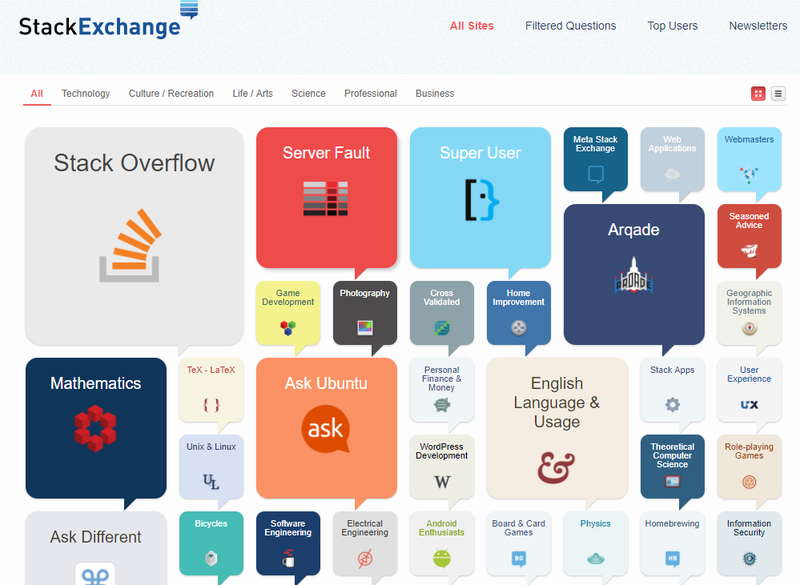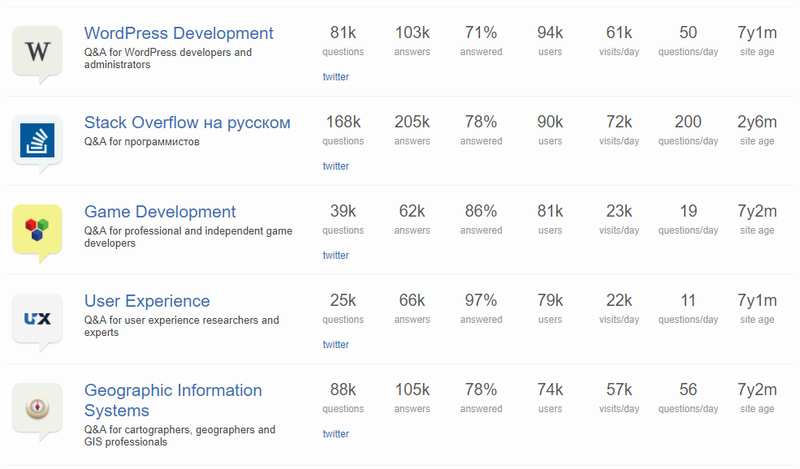e-Learning Ecologies MOOC’s Updates
Stack Exchange: An Example of Ubiquitous Learning
<b>Introduction, Part I: Ubiquitous Learning, Life-Time Learning, and Technology</b>
Ubiquitous Learning describes a learning environment where the boundaries of time and space are extended beyond the traditional boundaries of the classroom schedule and classroom walls (1). In the best case, ubiquitous learning describes an environment where learning happens at any time and at any place of the learner's choosing.
A corollary to Ubiquitous Learning is the Life-Time Learning, which describes a "habit of mind" where individuals continue to learn when no longer enrolled in a formal education curriculum.
Here we will review one technology, Stack Exchange, which assists with individual learning. After providing a brief introduction to the technology, we will note the strengths and weaknesses of thetechnology for the individual learner who is not participating in a formal class.
<b>Introduction, Part II: What is Stack Exchange?</b>
Stack Exchange, https://stackexchange.com/sites?view=grid, is an online forum where participants can post and answer questions. The site has about 133 topics, that range from computer programming, to Chinese Language, to Gardening and Landscaping. Below is a screen shot of the Stack Exchange web-site, showing some of the topics for which online forums are available.
Two aspects of Stack Exchange relevant to this discussion are its scale and its organization. Regarding the scale of Stack Exchange, we consider statistics for a few representative sites within the Stack Exchange community. The table below shows the topics on the site ranked 20 to 25 by the number of users.
The fourth column from the right shows the number of users, which ranges from 74,000 to 84,000 users. The third column from the right shows the number of visits per day, which ranges from 22,000 to 72,000 visits per day. The left most column shows the number of questions asked for this topic, which ranges from 25,000 to 168,00 questions.
Clearly, Stack Exchange has a scale which approaches the size of a small university and therefore is a significant contributor to the on-line learning ecology.
Unlike a university, the organization and content of Stack Exchange is driven primarily by the participants. Anyone can join a topic and anyone can post and answer questions. Questions and answers may be reviewed in a variety of ways, including grouped by chronology, by topic or sub-topic, and popularity. A search feature allows participants to identify questions and answers. To keep the content of the site focused on the topic at hand, participants can "flag" posts as inappropriate. Reasons that a post may be deemed inappropriate include sales material, offensive, off-topic, or low quality. Once the post has been flagged one of the site moderators will review the post and determine if the post should be removed. Each topic has its own moderators. The moderators are elected by the participants of the community.
<b>Analysis, Part I: How Stack Exchange Helps the Independent Learner</b>
Because participants can ask and review questions when as they arise and others can answer as time permits, Stack Exchange fosters a learning environment which is unbounded by time and space. A review of the quality of answers provided and the profiles of the contributors indicates that Stack Exchange provides a forum for any individual to interact with experts in that field.
In many cases a participant may learn without asking a question. Because Stack Exchange allows participants to review all questions and answers that have been asked in the past, a search of the site may provide answers even without asking a question. This feature of displaying information exchange to all participants has been described by Voettcher and Conrad (2) as a a key principle of effective learning environments (2). In some ways, this is like a student sitting in the back of the class, absorbing information from the discussion of others; however, with the Stack Exchange archives, participants can "listen in" to discussions that occur both in real time and in the past.
<b>Analysis, Part II: What Stack Exchange doesn't do for the Independent Learner</b>
Sometimes questions posted by participants remain unanswered. No participant is specifically tasked with answering questions that are raised. If the question is too difficult, ambiguous, or not interesting to other participants then a response may not be provided by others. A quick review of the statistics above shows that about between 3% and 29% of the questions posted are not met with answers. Note how this is markedly different than a traditional learning environment, where the instructor will go to great lengths to answer all questions from any student.
Stack Exchange offers the participant no direction about how to proceed to learn a new topic. Tutorials, syllabi, reading lists, and other artifacts of a typical structured learning path cannot be found in the Stack Exchanger archives. Participants must look elsewhere for direction regarding how to proceed on their learning path.
Summary
Stack Exchange is an example of a web-site that allows individuals to experience ubiquitous learning. Participants can get answers to questions from experts across the world; however, the site by itself is not sufficient for someone new to a topic to chart their own learning course.
References
1. Cope, B., and Kalantzis, M. (2017). Conceptualizing e-learning. in B. Cope and M. Kalantzis (Eds), e-Learning Ecologies. New York: Routledge.
2. Voettcher, J., and Conrad, R. (2016). The online teaching survival guide: simple and practical pedagogical tips. San Francisco: Jossey-Bass.




It is really important to check the reliability of any essay writing service because there are many charlatans and crooks, who want to steal your money, but I am not sure that you should look for genuine uk essay writing company. There are a lot of different features, which can help you to distinguish charlatans from ordinary services.
I don't aware more about Stack Exchange. But, it looks like a good initiative for participants who uses Stack Exchange to learn computer programming. Questioning and Answering is good to absorb new knowledge. But, as you mentioned that some asked question may be unanswered. This may make obstacle in the flow of new knowledge. Then, how ubiquitous learning will work in full mode through Stack exchange?